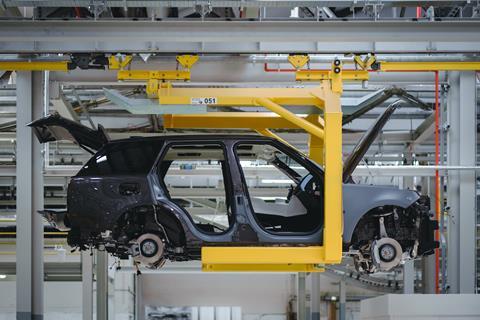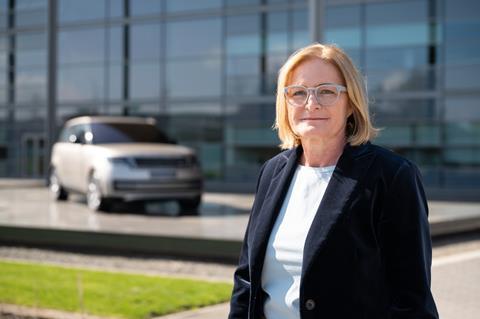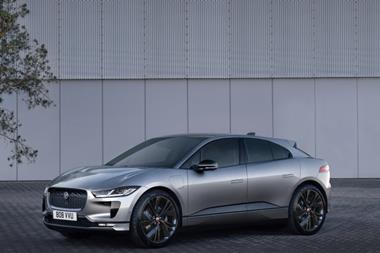Tata Group has confirmed it will build a £4bn ($5.2bn) battery cell gigafactory in Somerset in the UK, establishing a regional battery supply chain for JLR.

Tata Group has formed a new subsidiary known as Agratas for its global battery business, which was also announced today. As the first Agratas plant, the gigafactory will have capacity to produce 40 GWh of battery cells annually for customers of Tata Motors and JLR (which is owned by Tata) across the UK and Europe. Tata said it has strategic growth plans for its flexible manufacturing capacity which will begin with a ramp-up phase and the start of production in 2026. The gigafactory, which has been reported to be in Bridgewater, although this hasn’t been confirmed, is Tata’s first to be based outside India.
The cell factory is expected to create significant efficiencies in logistics and manufacturing for JLR, especially compared to earlier speculate that Tata could build the plant in Spain. It is the most significant battery cell project announced thus far in the UK, whose government has provided financial support for the project.
“Our multi-billion-pound investment will bring state-of-the-art technology to the country, helping to power the automotive sector’s transition to electric mobility, anchored by our own business JLR,” said Natarajan Chandrasekaran, chairman of the board, Tata Sons. “With this strategic investment, the Tata Group further strengthens its commitment to the UK, alongside our many companies operating here across technology, consumer, hospitality, steel, chemicals and automotive.”
Tata said it “intends to maximise its renewable energy mix” at the gigafactory with a goal of 100% clean power.
Tata had also been considering basing the gigafactory in Spain before choosing the UK. Rishi Sunak, UK Prime Minister said that this would be “one of the largest ever investments in the UK automotive sector”.
The Society of Motor Manufacturers and Traders (SMMT) has recently been vocal in asking the UK government for an industrial strategy to help the industry in its transition to EVs. Today the SMMT welcomed the announcement of Tata’s new gigafactory. Mike Hawes, chief executive, SMMT said: “This is a shot in the arm for the UK automotive industry, our economy and British manufacturing jobs, demonstrating the country is open for business and EV production. It comes at a critical moment, with the global industry transitioning at pace to electrification. Producing batteries in the UK is essential if we are to anchor wider vehicle production here for the long term. We must now build on this announcement by promoting the UK’s strengths overseas, ensuring we stay competitive amid fierce global pressures and do more to scale up our EV supply chain.”
Read our analysis of what Tata’s new UK battery gigafactory means for the wider supply chain
JLR, which has been part of Tata Motors since 2008, has been reorganising and investing in its supply chain operations since 2021 as part of its ‘Reimagine’ strategy, and has been pouring billions into its existing UK plants to ready them for electrification, including adding new models, battery pack production and upgrading its supply chain systems at its factories.
In a statement on LinkedIn, JLR said: “Our ‘Reimagine’ strategy is now entering an exciting new phase. This new site close to our manufacturing base will give us a stable battery cell supply, underpinned by renewable energy, at competitive cost. This decision, coupled with our own investment in electrification of £15 billion over the next five years, will help secure the British car industry and build a thriving EV industrial ecosystem in the UK.”
As part of its investment, JLR announced in spring that it would convert its engine plant in Wolverhampton, UK to also assembly battery packs and electric drives.

In an interview with Automotive Logistics in May, Barbara Bergmeier, executive director of industrial operations at JLR said the firm wants to work with strategic suppliers while being less reliant on the supply base. “As electrification is creating a new value chain, we need to ensure the right supply and demand in the coming years because all OEMs will walk in the same direction,” she said. “If you look at the lead times for chip manufacturing and foundries, you need to work at least two years ahead to get the right allocation. Likewise, if you go through the whole value chain, including inverters, motors and battery packs, that’s where we have decided what we want to design and manufacture in-house.”
At the time, she said that JLR would optimise the battery supply chain regardless of where Tata chose to locate it. However, creating a more regional supply chain will eventually create efficiencies in the carmaker’s manufacturing and logistics.
While it will take three years for the new plant to become operational, JLR will not be left waiting to roll-out new EVs. It continues to build the I-Pace electric vehicle at the Magna Steyr contract manufacturing plant in Graz, Austria. The carmaker’s vehicle production plant in Halewood, England will be JLR’s first all-electric plant, producing its new electric Range Rover medium-sized SUV from 2025. The carmaker will continue to work with other battery cell suppliers in advance of Tata’s gigafactory going into operation.
The Advanced Propulsion Centre (APC), which collaborates with the UK government and provides funding to the automotive industry to build supply chains, also welcomed the decision. Ian Constance, CEO of the APC said the investment by Tata will be a huge boost to the UK’s EV manufacturing and supply chain sector. “The UK offers an extremely competitive landscape for investment in the full research, development and manufacturing ecosystem for EV technologies and this has been recognised by Tata,” he said. “[Tata’s] commitment to this gigafactory development has already had a transformative impact in awakening the battery supply chain sector to opportunities in the UK.”
Constance added that APC’s research found that the UK will need over 89 GWh per year of batteries for vehicles by 2030. “We have a vibrant and diverse industry, and Tata’s significant investment through JLR in research and development and manufacturing will help establish competitive supply chains and satisfy this burgeoning demand, and in doing so will create thousands of highly skilled green jobs,” he said.

























![Global[1]](https://d3n5uof8vony13.cloudfront.net/Pictures/web/a/d/s/global1_726550.svgz)












No comments yet